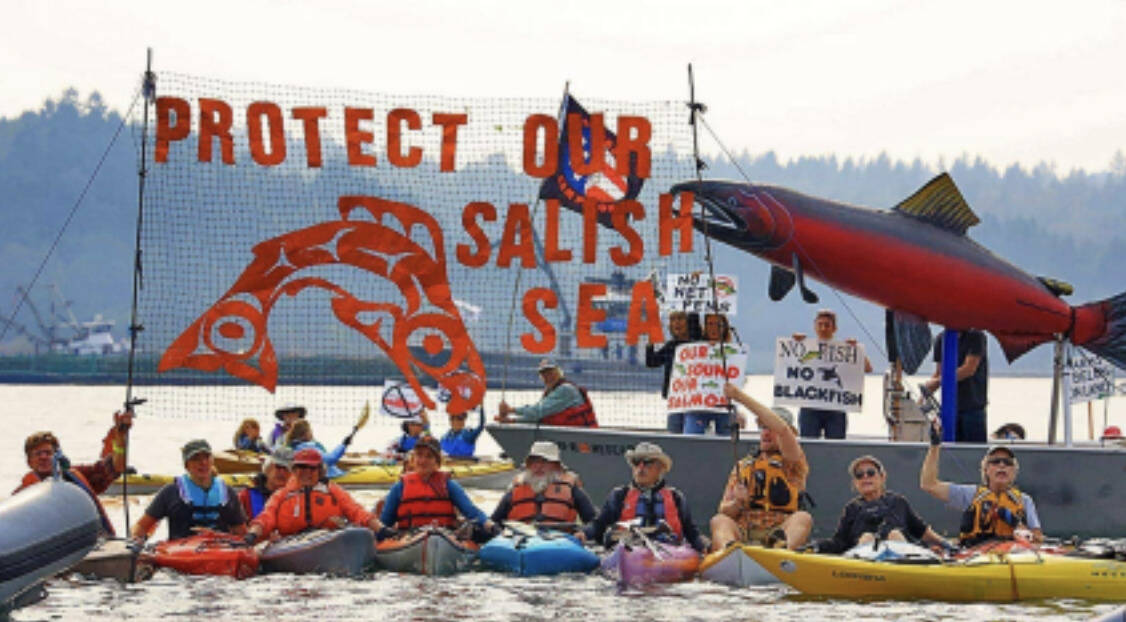Submitted by Wild Fish Conservancy.
Washington state recently garnered international attention for its successful removal of all polluting and hazardous commercial net pens from Puget Sound. Now, the state is on the verge of adopting a statute that would prohibit this commercial industry from ever returning to Puget Sound. Washington would be the first place in the world to both entirely remove the existing industry and permanently ban future operation of commercial net pens in marine waters.
In 2022, responding to the concerns of the public and the well-documented record of ecological harm, Washington’s Commissioner of Public Lands, Hilary Franz, rejected applications from seafood giant Cooke Aquaculture seeking new leases to continue operating their commercial net pens in Puget Sound. Concurrently, she issued a new executive order prohibiting commercial net pen aquaculture in Washington marine waters. Cooke Aquaculture is the company responsible for the catastrophic Cypress Island net pen collapse in 2017, which released over 260,000 nonnative, virus-infected Atlantic salmon into Puget Sound.
The commissioner’s decision required Cooke Aquaculture to remove all farmed fish and net pen infrastructure. Consequently, 2024 is the first year in over four decades that Puget Sound is free from the ecological harm and risks associated with industrial net pens, including, but not limited to, the discharge of massive amounts of daily untreated pollution, including fecal waste, feed and pharmaceuticals; the amplification and spread of native and exotic viruses and pathogens harmful to native wild fish; bycatch of wild fish during the harvest of farmed fish; and chronic and catastrophic escape events.
Prior to the decision, 10,000 individuals, over 100 businesses and organizations and numerous Washington Tribal Nations urged Commissioner Franz to cease leasing public waters in Puget Sound for this ecologically destructive practice.
Now, Washington is poised to permanently adopt the executive order banning the commercial operation of net pens. On Jan. 7, the six-member Board of Natural Resources, chaired by Commissioner Franz, will cast a crucial vote on the proposed rule, that if approved, will cement the order into statute, preventing these facilities from returning and ensuring the protection of Puget Sound for future generations. The rule would also support Washington’s commitment to protect Tribal treaty rights, food security and cultural practices, and does not affect non-commercial tribal operations, including acclimation net pens.
Beyond Washington, the decision would set a powerful precedent and model for coastal communities around the world fighting to eliminate or transition this industry out of their home waters. In June, the Government of Canada announced its continued commitment to banning open net-pen salmon aquaculture in British Columbia coastal waters by June 30, 2029. British Columbia is the last remaining jurisdiction on the North Pacific Coast with commercial net pens remaining in marine waters.
“Cooke Aquaculture and their allies in the aquaculture industry are doing everything they can to influence the upcoming vote in a desperate attempt to return this polluting industry to Puget Sound. We’ve come too far to let corporate interests undermine the incredible progress we’ve worked so hard to achieve,” says Helverson. “It’s urgent that we come together one final time to ensure Puget Sound will continue to be protected for future generations.”
There are several important opportunities to engage in this important process and ensure your voice is heard by those making this critical decision. 1) Sign the “Our Sound, Our Salmon” petition to the Board of Natural Resources (https://www.oursound-oursalmon.org/sign-the-petition-bnr).
2) Send an email to the Board of Natural Resources.
3) Attend the public hearing on Jan. 7, at the Natural Resources Building in Olympia, Washington.
For more information, visit www.oursound-oursalmon.org/take-action.




